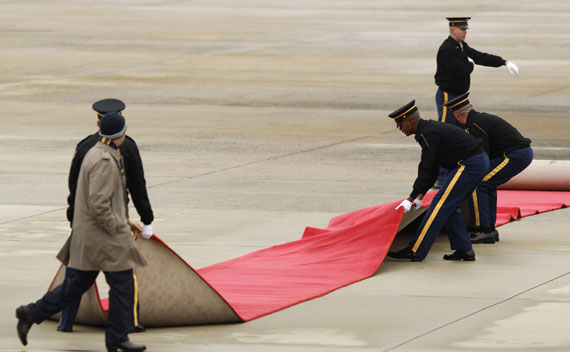TWE Quick Takes: Hu Makes Nice, Obama Talks Tough
More on:

A few more news items left over from a three-day weekend.
- Presidents Hu and Obama hit different but politically understandable notes in the run-up to the Chinese leader’s arrival in DC today. Hu is stressing our common interests and the need for U.S.-Chinese cooperation. White House officials are saying Obama intends to press Hu on North Korea, currency, and human rights. It makes sense for Hu to make nice; he needs to tamp down and not inflame talk about a more belligerent China. Meanwhile, Obama needs to satisfy domestic audiences that he is standing up to his Chinese counterpart and not bowing before him. Both sides know that political theater is at play, so the mismatched messages won’t derail the visit.
- Russian Foreign Minister Sergei Lavrov said last week that future arms control talks must include other nuclear powers (read: China) and go beyond nuclear weapons to cover space weapons and strategic missiles equipped with conventional explosives. If Moscow sticks to this position, forget about seeing another arms control agreement any time soon. (Of course, President Obama’s difficulty in getting the modest New START Treaty through the Senate may have the same effect.) The Senate will not consent to any treaty that restricts missile defense or conventional weaponry, two areas in which the United States has a sizable advantage over Russia. Beijing for its part is expanding its nuclear forces rather than limiting them. The White House wants Moscow to slash its tactical (or short-range) nuclear weapons, which happens to be one category of weapons in which Russia has a substantial numerical lead on the United States. Moscow doesn’t want to give away something for nothing, especially when that something (tactical nukes) can offset the weakness of its conventional forces. Russia shares a 2,700-mile long border with China that has on occasion been the source of conflict.
- My colleagues Elliott Abrams and Steven Cook are offering up some smart commentary on recent events in Tunisia and their consequences for the Arab world. Try here, here, and here. Arab leaders must be feeling a bit uneasy this week.
- Ian Buruma has a great piece in the New Yorker on the “disuniting” of Belgium. The Dutch-speaking Flemish and the French-speaking Wallonians want less and less to do with each other and would love to go their separate ways. The complete article isn’t available online, but it’s worth picking up a copy at the newsstands or checking it out at the library if you don’t subscribe. The irony, of course, is that Brussels is home to the European Union and the idea of a united Europe.
The good news is that Belgium’s internal political tensions haven’t disrupted the production of Belgian beer. I may treat myself to one tonight.
More on:
 Online Store
Online Store